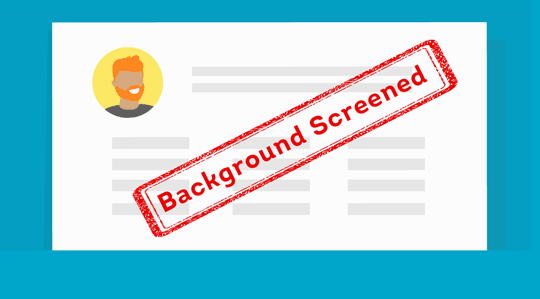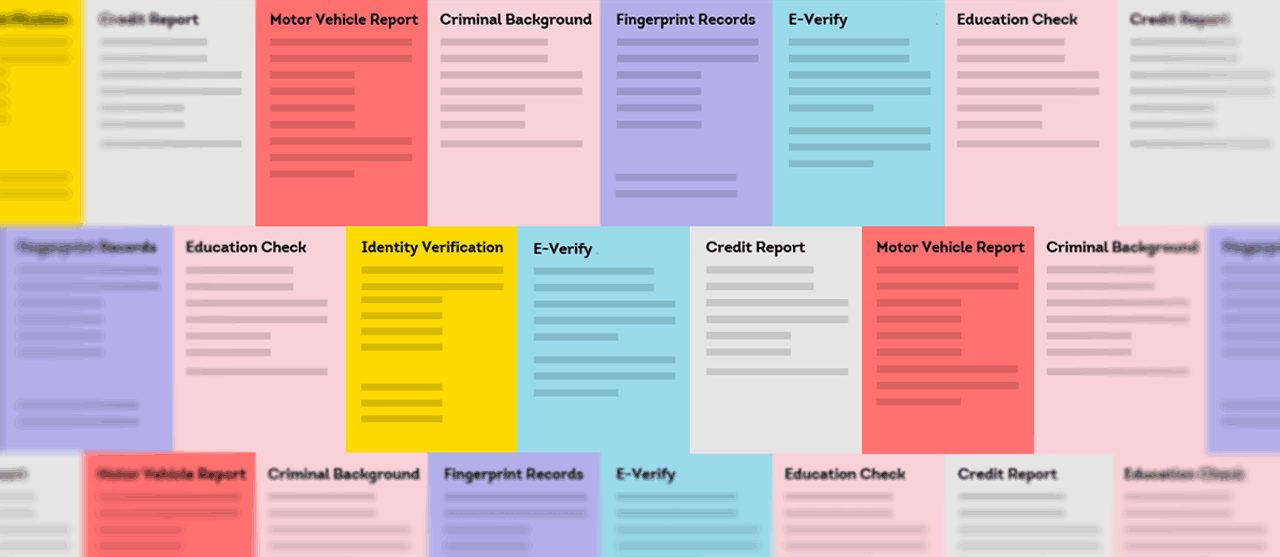Let’s paint a no-so-pretty picture: you hired a freelance artist to design your new logo. Two months later, they’re still fretting over the deeper meaning of color choices and you’re left delaying your relaunch. Or—even worse—you gave a freelancer your 50% upfront deposit and now they’ve completely vanished.
While most small businesses are familiar with the process of hiring great full-time employees, it has now become imperative to protect your business by also learning how to effectively hire a good freelancer too. It’s also just as important to conduct pre-employment background checks as well. If you don’t, it could harm your bottom line.
The term “Freelancer” often refers to self-employed professionals who provide creative work on a temporary basis—such as writers or graphic designers—but can also refer to people who do any job, such as accounting. Businesses often look for freelancers on freelance-specific job boards and can hire freelance employees for a variety of reasons, including:
- Budget constraints
- There’s not enough work to justify a full-time hire
- The work is seasonal or temporary
According to a LinkedIn survey, approximately 70% of small business owners have hired a freelancer at one time or another.
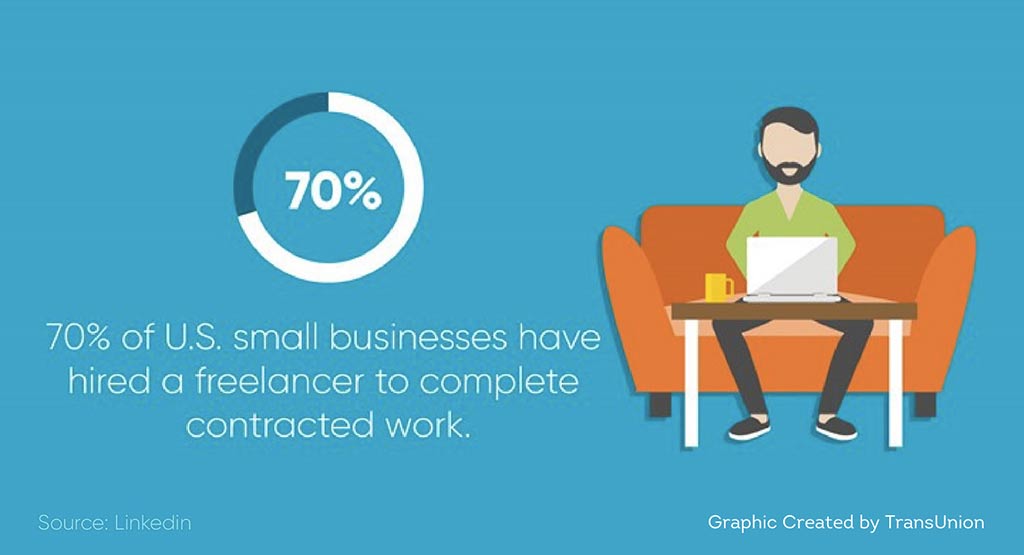
In many situations, hiring a freelancer comes at a lower cost than hiring a regular employee—especially if you just need help with a one-time task. In 2019, freelancing and consulting work was $19 per hour, though this average varies widely by industry and skill level.
Even if a freelancer costs much higher than average, it can still be cheaper than hiring a full-time employee once you factor in wages, payroll taxes, benefits and other employment expenses. What’s more, when you build relationships with high-quality freelancers, you can often re-hire them on an as-needed basis.
Although hiring a freelancer might make great practical and financial sense, you must be especially careful. Just as anyone can call themselves an “artist,” anyone can call themselves a “freelancer.” This makes it especially important that you do your due diligence and thoroughly vet all freelancers through a comprehensive employee screening service like ShareAble for Hires.
In this article, we’ll take a closer look at the process of how to hire a freelancer that meets your needs, budget and business goals.
When to Hire a Freelancer for Your Small Business
Before bringing anyone new on board, it’s important to consider if you need a freelancer and what kind of work you could give them. Hiring a freelancer for your small business is a useful tactic when you need an extra pair of hands to help out on a project, but you might not want to outsource work that’s particularly sensitive to the success of your business.
For example, hiring a freelancer to oversee client projects might not be a good idea, because they’re probably not as familiar with your business operations as a current employee. On the other hand, hiring a freelancer to complete graphic design or provide social media consulting may be a great solution to your team’s needs.
Situations in which a freelancer may be helpful include:
- Specialized tasks: Some small business owners might hire a freelancer to do specialized tasks, including writing, marketing, legal review, graphic design, and more.
- Lower-skill tasks: Freelancers can also take on low-skill work that eats up your valuable time, allowing you to focus on growing your business and utilizing your specialized skills. Perhaps you run an accounting firm and need help with data entry, spreadsheet creation, and data pulling. A freelancer with this kind of experience could help you complete these tasks, which lets you focus on opportunities for expansion.
- Seasonal or short-term work: If you are not yet ready or able to take on a part-time or full-time employee, freelancers can fill in the gaps for seasonal or short-term, on demand work. Additionally, work can be assigned to freelancers in cases where a formal hiring process may take several weeks or even months, and there is a more immediate need for professional or expert skills.
Freelancers can be used to streamline your daily operations in a variety of ways, and businesses in all industries are learning how to use these remote employees to their advantage.
In fact, freelancer platforms expect contracted work to be the norm soon. According to a survey by Upwork and Freelancers Union, the majority of the U.S. workforce may be made up of freelancers as soon as 2027.
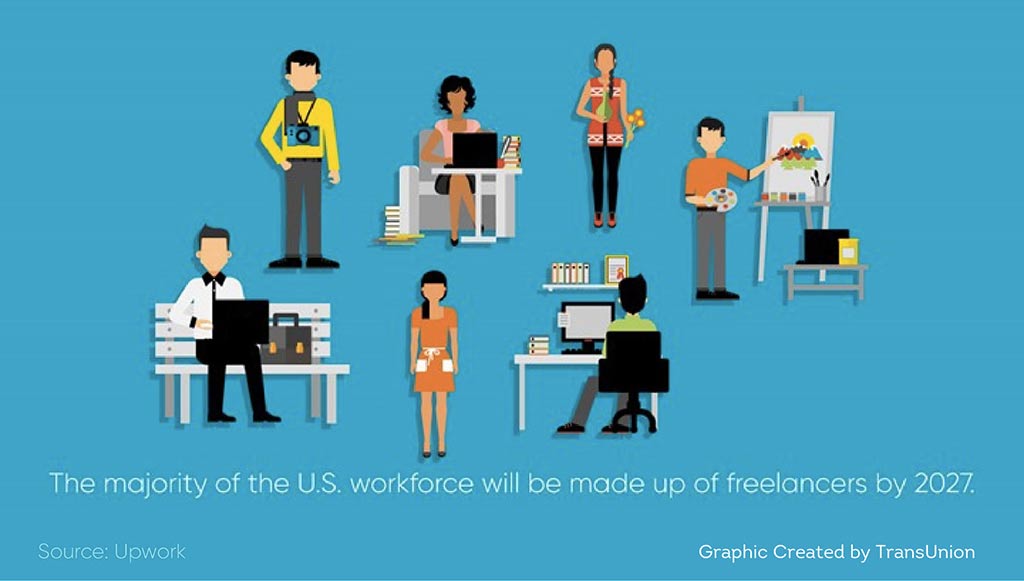
Make sure to review the Department of Labor standards on independent contractor classification and consider the following when determining how to classify your hires:
By refining your freelancer hiring process, you can take advantage of this valuable subset of the working population.
Classifying Your Freelance Employees
If you do hire a freelancer, it’s imperative to comply with all appropriate tax regulations and employee classification requirements. Misclassifying an employee can lead to significant legal issues and other complications.
Make sure to review the Department of Labor standards on independent contractor classification and consider the following when determining how to classify your hires:
- The extent to which the services are considered a necessary part of the business.
- How long the relationship is expected to last.
- The nature and degree of control by the employer.
- The alleged contractor's opportunities for profit and loss in connection with the business arrangement.
- How much the alleged contractor is able to compete in an open market.
If you are not completely certain of how to classify your workers, you may want to consult with qualified legal counsel to ensure your freelancing position is managed appropriately.
Determine Timeline & Budget
Determining your freelance timeline and budget will require an understanding of a number of different factors, all of which will impact how you frame your project description and screen potential hires. Ask yourself the following questions when preparing for your search:
Is this a one-time or ongoing project?
- One-time projects could be writing an article, designing a logo, or coding a website.
- Ongoing projects are tasks that might occur more frequently. Examples could include administrative support, data entry, or webmaster/IT support.
Note: In some cases, a one-time project could become a series of projects, such as writing a series of articles.
Will you pay a fixed or hourly rate?
- In general, a fixed rate makes sense for a one-time project—such as a complete redesign package—while hourly is likely more appropriate for on-going work, such as responding to customer emails.
- There may be some cases where an hourly rate for a one-time project is the most appropriate set up, for example, if your freelancer allows for a high number of revisions or if it is a project that could last several months.
- Depending on industry and field, the hourly cost of a freelancer can vary significantly. For example, the average hourly rate of a freelancer in the legal field is $28, while the average hourly rate for a freelancer in the administration field is $11.
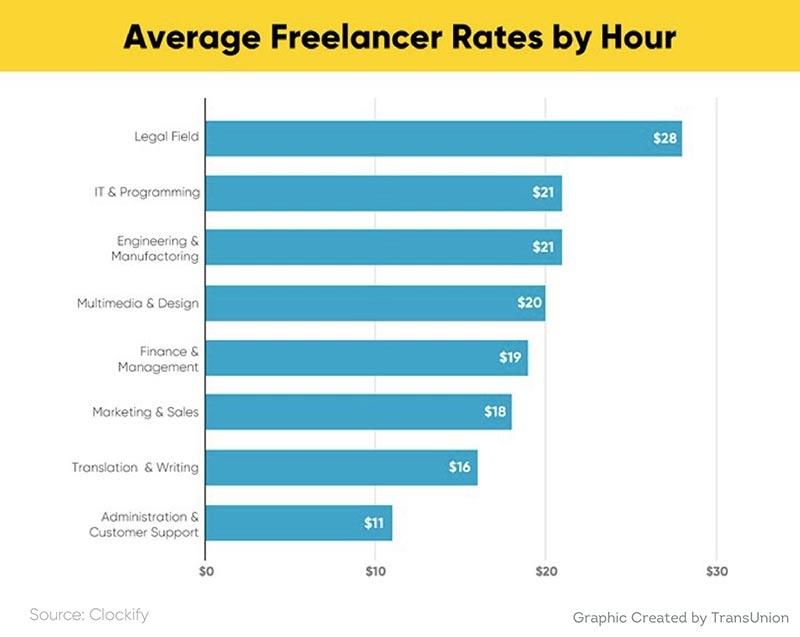
Are you looking for an entry level worker or someone with more experience?
- Keep in mind that more experienced/expert freelancers will likely have higher rates—but this may still be more affordable to you than the overhead costs of hiring an employee with the same level of experience.
- Also consider that while inexperienced freelancers might have a cheaper hourly rate, they could take longer to complete a project than a more experienced provider.
Outline Your Project
Before seeking out freelancers, you need to develop a clear plan of your project so that you and your future freelancer agree on expectations from the outset. To create a thorough scope of your expectations, ask yourself the following questions as you outline your project:
For a fixed-rate project:
What does the freelancer need to deliver in order for the project to be completed?
- If writing, what is the word count? If data entry, how many lines of data? If design, how many possible versions should they offer you?
Will you expect a need for revisions or re-dos in this project? Include an expectation for this if working on a design or writing project.
- Freelancers may offer a specified number of revisions per project, so discuss your expectations upfront.
- Some freelancers may also require you to sign an agreement that stipulates revision and payment policies before beginning work. This practice is common, but make sure to read the agreement carefully before signing it.
What is the deadline for the final project?
- Are there milestones that need to be met throughout the project? For example, if you need a freelancer to design a new logo for your company, you may allot three weeks for the project, with five preliminary design drafts due at the end of week one, more detailed version of the top two designs at the end of week two, and the final product due at the end of week three.
- If necessary, be prepared to lay out clear timing and deadline expectations for the freelancer as soon as they begin work.
For an on-going project:
- How many hours per week do you expect them to work?
- Will you need them to work on a set schedule? If so, remember to account for time zone differences with remote workers.
- What do you expect the freelancer to complete each week?
You can use freelance hiring guides like to find specific project description elements for a variety of industries and project types.
Be sure to avoid common first-time hiring mistakes in your job description and project outline, such as being vague about your needs or not providing the freelancer with enough information to give you an accurate quote.
Choose the Right Freelance Job Board to Post Your Project
The gig economy is booming, and there are plenty of freelancers to choose from. A 2017 study by Upwork found that there were approximately 57.3 million freelancers working in the U.S., with 90.1 million projected in 2028.
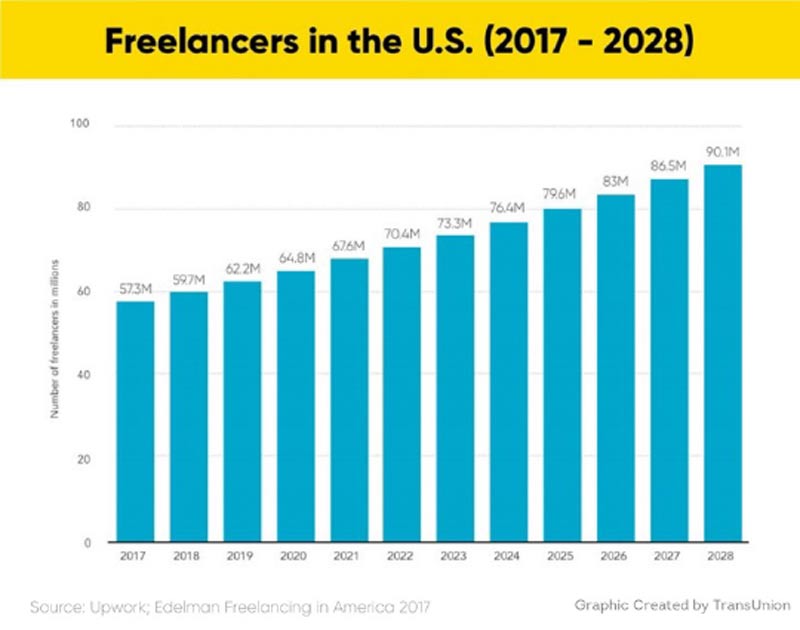
The rise of job-seeking freelancers has led to the creation of many freelance job boards for both general and specialized freelancers.
Some of the most popular job boards to bolster your freelance recruiting efforts include:
1. Upwork
Upwork is one of the most popular freelance platforms, with thousands of freelancers in dozens of skill categories, including marketing, legal, accounting, customer service, IT, writing, engineering, and architecture.
Once you post a job listing, Upwork matches you to potential candidates based on your job description and needs. The platform also includes job success rates and ratings and reviews for all freelancers, which can simplify the hiring process.
2. Guru.com
Guru is known for their network of expert freelancers and claims more than 3 million available freelancers on their platform. It is free to post a job, and Guru keeps track of the previous freelancers you’ve hired so you can easily return to previous hires for future assignments.
3. Fiverr
Fiverr is great for simple, one-time tasks. Set up somewhat like Etsy, sellers create “packages” of the services they offer, with a basic, standard, and premium level for three set prices. Their visual platform is easy to navigate and includes ratings and reviews of sellers, much like other platforms.
4. Freelancer.com
Freelancer.com is another major player among freelance platforms, and features a simple, streamlined, and intuitive job posting process. In addition to profile reviews, Freelancer also has work samples from freelancers that you can view ahead of time to help you decide whether their work meets your expectations.
Although all of these sites offer preliminary candidate screening, it’s important to take additional steps in order to protect the interests of your business.
Evaluate & Screen Freelancers
After receiving applications and proposals from freelancers who would like to work on your project, you can approach the rest of the process similar to any other hiring process.
1. Initial Review
First, review the list of applicants and disqualify anyone who doesn’t meet your requirements. Most job boards have skill levels, reviews, and job success rates for freelancers. Use these as criteria to screen your applicants, especially if you have a project that requires a very specific skill level or expertise.
Pro Tip: Consider verifying an applicant’s education if you’re hiring for a project that requires a degree of specialization. Education verification for employment can help confirm the applicant actually has the required degree or certifications they claim.
2. Conduct a Phone Interview
Choose your top three or four candidates and reach out for a preliminary introduction. Because freelancers typically work remotely, a phone and/or video interview is likely the most direct contact you will have with your candidates before making a hiring decision. Ask basic screening questions that cover:
- Current workload and availability
- Experience
- Certifications
- Billing and fees
- Turnaround time
- Examples of similar work in the past
- Relevant training or familiarity with your field
You should also consider their overall communication style; if they’re working remotely, will you be able to get in contact with them quickly when needed? Are they responsive to your questions? Cooperative? Ensuring a great working relationship is essential, especially when the team is spread out over large distances.
3. Offer a Paid Assessment
If you are looking for a freelancer for a long-term engagement, consider giving them a trial assignment first to help you assess their work before you commit to an extended contract.
A trial assignment should be a short, low-risk/low-importance project that requires the skills you are looking for. You will need to pay the freelancer for their time working on the trial assignment, so make sure you account for that cost in your budget planning.
4. Run a Background Check and Check References
Freelance employees may have the same type of access to business data, facilities, colleagues, and clients as full-time employees, so they should be held to your company’s screening policy. You want to make sure that your new hire is who they say they are, has the credentials they claim, and does not have a pattern of past behavior that could mean damage to your business.
Pre-employment screening can provide peace of mind when bringing on a new hire, whether or not the freelancer is working remotely or comes into the office. In addition to running a pre-employment background check, you can check their references or recommendations from past clients to get a sense of the quality of their work.
ShareAble for Hires offers comprehensive online background checks that can be completed within minutes. Within a ShareAble for Hires background check, employers gain access to crucial information about their applicant, including:
- Credit History: If your freelance job candidate will have access to important company information, you may want to assess their financial history.
- Criminal Records: Protect fellow employees, clients, and customers by assessing your job candidate’s criminal history.
- Identity Verification: Make sure your freelance hire is who they say they are with identity verification.
The screening process is simple:
- Create and free account and supply your freelancer applicant’s email address
- We’ll send a request to run a background check. When they provide authorization, we’ll run the report immediately
- Within minutes, you’ll receive the results of your freelancer’s background check to your inbox.
By following the above steps, you can streamline your hiring process to find a freelancer that meets your project needs and budgetary constraints.
Key Takeaways
In the broadest strokes, hiring a freelancer can open up a whole new world of opportunities for small business owners. Freelancers can fill in the gaps within a growing business, or take on tasks that free-up both business owner and current staff. However, while hiring freelancers can be an excellent way to boost efficiency and profits, it can still open up your livelihood to a whole slate of potential risks. As you consider bringing on freelancers, it’s imperative to use comprehensive employee screening to avoid painting yourself into a corner
ShareAble for Hires gives SMB’s a convenient way to conduct online background checks with near instant speed. The SMB gets critical information that must be reviewed before they give the thumbs up to the freelancer to begin work. The freelancer has the ability to share important information quickly all the while explicitly consenting to screening. That means they share their sensitive data with whom they want, when they want.
Trust is a 2-way street and ShareAble for Hires helps both the SMB and freelancer ultimately to gain trust in the moment with our reports, sent directly from TransUnion to both the business and the freelancer.
Verifying a potential freelancer’s skills and background up front can help you find the best fit. After all, Picasso, famous for using cubism, was a great artist, but maybe not the best fit to design your next corporate logo. Help find a freelancer to turn your business into a masterpiece with ShareAble for Hires.


